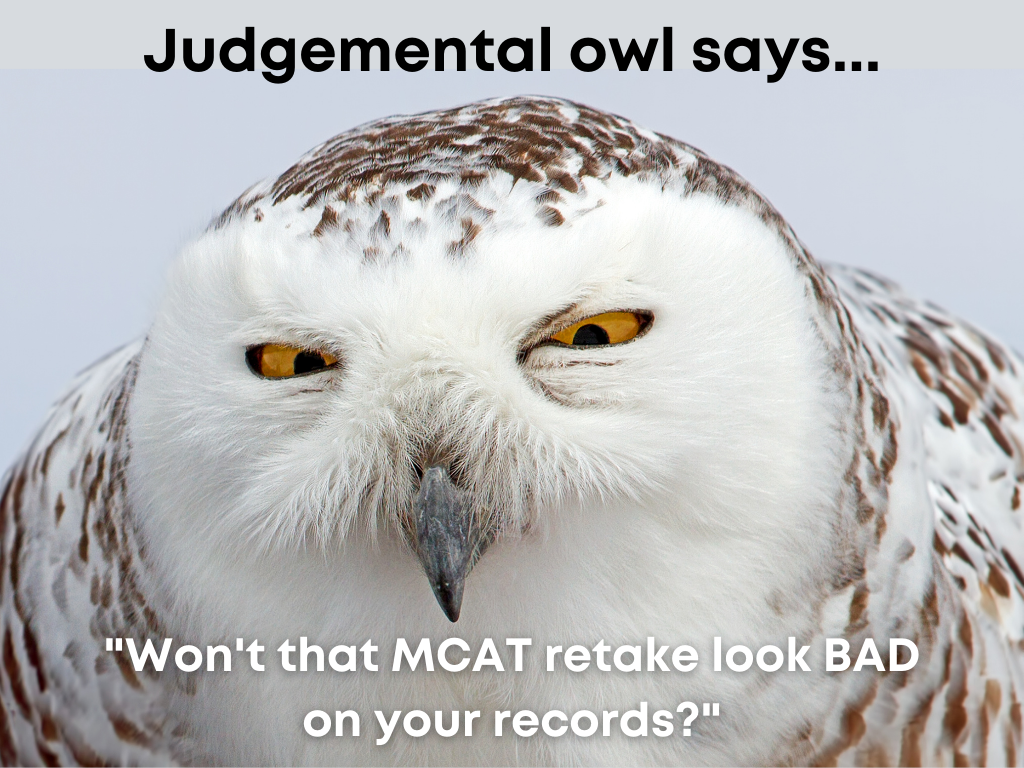Humankind just LOVES a good myth. From pantheons of gods, Y2K, and astrology (please don’t hate me) to cryptids like the Loch Ness Monster, Bigfoot, and chupacabras … you name it, we’ve cooked up an anecdote or (scientifically unfounded) belief system for it.
The problem with myths is that, while beguiling, they distract from what is true, factual, and therefore helpful. For example, how much money would NASA have saved on stocking the Apollo missions with crackers had they known that the moon was not made of cheese?
In the case of MCAT myths, the distraction can be especially problematic. The Medical College Admissions Test is a huge deal for aspiring doctors, and because of that, candidates are desperate to understand the nature of the beast. In that desperation, kernels of truth are often mutated into myths, which are then propagated faster than the coronavirus.
Sorry, it’s probably too soon for that joke.
Anyway, it is Brainscape’s goal, nay, our scientific responsibility as a team of MCAT nerds, to set the record straight. In this guide, I’ll be addressing, one by one, the 8 most common MCAT myths you need to expunge from your hippocampus immediately.
Ready? Let’s go!
MCAT Myths: A High MCAT Score Is Vital For Medical School Admissions

Traditionally, stratospherically high MCAT scores were considered your Willy Wonka golden ticket to the medical school of your dreams. And while MCAT scores are still an important part of the admissions process, the AAMC has come up with a new grading system that takes the pressure off of students to pull off supernatural feats of exam performance.
In other words, a mid-range score can get you into a good medical school, provided the other parts of your application, like your personal statement and interviews, are memorable. This isn’t permission to blow off studying in favor of Netflix … it’s just to say that not scoring in the 95th percentile is far from the end of the world.
MCAT Myths: Every Question Counts.
Another popular misconception about the MCAT is that every question counts, which makes students feel positively awful if they don’t know the answer to one. And to this, we say with a flourish: WRONG!
The MCAT is a monster of an exam, and it’s your overall performance that matters. So, don’t spend more than a few minutes on each question, and if you’re really stuck, move on. Agonizing over a missed question or two is more futile than ordering a Diet Coke with your supersized Big Mac meal.
Here’s another pretty important point: quite a few of the MCAT’s questions aren’t even graded! That’s right, the AAMC is torturing you for nothing!
Just kidding. Actually, they’re testing those questions out for future examinees.
That’s right, the AAMC is using you as a guinea pig!
MCAT Myths: You Can Take The MCAT As Many Times As You Want
Sorry, nope! You can only take the MCAT 3 times in any one-year period; 4 times in two consecutive years; and 7 times total in your lifetime.
But just because you can retake the MCAT multiple times doesn’t mean you should. I can Hoover down an entire family-sized packet of SmartFood popcorn in a single sitting. But should I? Well, my brain says “yes”, but my kidneys say “no”.
A lot of students retake the MCAT again and again in an effort to smash out a 520+ score, which is a waste of time and money, not to mention incredibly stressful. So, do your best to pass the first time with a decent score, but failing that, try again!
MCAT Myths: It Looks Bad To Retake The MCAT

On the flip side of the above-mentioned coin, there’s this silly MCAT myth that retaking the MCAT will make your record or med school application look bad.
As tempting as it is to think this way, medical schools aren’t run by a bunch of cantankerous trolls. They’re (often compassionate) human beings who understand just how hard the MCAT is. And since MANY students retake the MCAT on their journey to becoming doctors, a retake or two is not going to be a blight on your record.
Besides, absolutely NO medical school has a policy of rejecting applicants because they took the MCAT more than once. So, yeah: take that, judgemental owl.
MCAT Myths: You Need Knowledge Of Upper-Division Sciences To Do Well
Another ridiculous misconception about the MCAT! You simply do not need to be an expert in the sciences in order to do extremely well on the test. In fact, according to the AAMC, you only need an introductory level of knowledge of physics, biology, organic and inorganic chemistry, biochemistry, psychology, and sociology.
Sure, some of the passages may describe upper-division science topics, but the context they give you will be sufficient for you to deduce the answer/s. So, relax and make sure you split your time equally between content learning/memorizing and Critical Analysis and Reasoning Skills (CARS) practice.
MCAT Myths: Since CARS Is A Reading Section, I’ll Devote More Time To Learning Science Content
Here’s a fun fact: Humanities majors tend to outperform biological science majors on every part of the MCAT. And do you know why? The humanities subjects teach students how to read, comprehend, discuss, and dissect written work.
This tells us that the CARS section of the MCAT is a crucial component that makes up a huge portion of your test score. Medical school admissions officers view these skills as a measure of a student’s ability to learn and communicate, which is just as important as being knowledgeable in the foundational sciences.
So, say it with me now: there is only one way to outsmart the MCAT, and that’s to become a CARS section assassin.
MCAT Myths: It All Comes Down To Test Day

It does, in a way. But then again, it doesn’t. You see, while your MCAT score is decided by your performance on test day … that performance is decided by (1) the work you put in and (2) the lifestyle choices you make leading up to that day.
The Work You Put In
You can study your butt off and practice questions every day. But nothing will prepare you for the marathon that is the MCAT quite like sitting down to a full-length practice exam under real test conditions. In fact, you should do several full-length practice exams throughout your prep so that you know how it feels to sit and take an exam for close to 8 hours.
The Lifestyle Choice You Make
You should be taking very good care of your body and mind throughout this stressful time. Proper nutrition, sleep, hydration, exercise, and stress-management strategies are all incredibly important; they all lend themselves to helping you perform well on exam day. And they are not a one-day deal. They’re a consistent, day-in, day-out deal.
A final facet of the MCAT myth that everything comes down to test day is the logistical preparations you should consider. For starters, you should definitely drive to the examination venue at the time and on the particular weekday you plan to take the MCAT so that you know the route, traffic patterns, and where to find parking, etc.
And then if you’re a night owl, don’t book your test for first thing in the morning! Or, if the test time is fixed, make sure you get your sleeping patterns sorted out several weeks before. In other words, start going to bed early and getting up early. You don’t want your exam performance to be affected by something as silly as feeling sleepy because you’re accustomed to sleeping late.
So, you see? It’s not only about test day; it’s about the practice you put in, your general health and wellness, and the preparations you make ahead of test day.
MCAT Myths: Wait Until You Know Enough To Start Practicing
I can’t emphasize this enough: MCAT practice is an integral part of your preparation, which you should be doing as early on as possible.
Practicing questions, passages, and full-length exams will reveal to you what the MCAT looks like and what to expect from it, which will help you study more efficiently. And it’s through this essential work that you’ll come to appreciate how the MCAT tests “the bigger picture” rather than the nitty-gritty details.
Also, if you wait until you feel 100% prepared, you’ll simply never get your practice off the ground. So, dig in from day one and you’ll be a lean, mean MCAT annihilation machine by the time the exam rolls around.
A Final Note On MCAT Myths
This fairly lengthy discourse on misconceptions about the MCAT doesn’t even begin to cover all the hogwash out there. Moreover, new myths get cooked up all the time, like these ones:
- You need to study for a year to do well on the MCAT. No, you don’t; you should aim for 200 to 300 hours of MCAT study time.
- Your score depends on the performance of the students you take the exam with. It doesn’t, the MCAT is a standardized test.
So, here’s our take-home message. Always go to the source for your information (that would be the AAMC, the official test-makers) and don’t get distracted by other people’s guesswork, gossip, and fear-mongering.
You’ve got what it takes to do well, so study hard, get in plenty of practice, look after yourself, and you’ll rise to the challenge of the MCAT!
